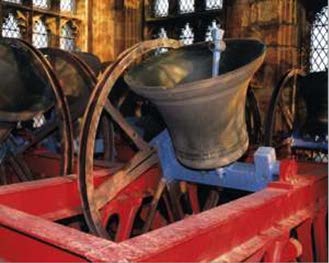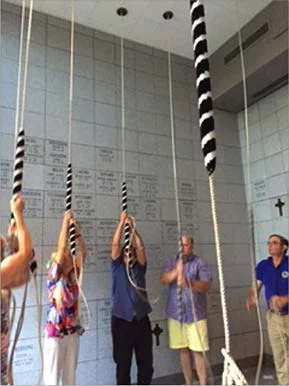Benefits of Being a Church Bell Ringer
For those who live in Charleston, referred to as the “Holy City,” hearing Church bells ringing their rhythmic melodies is no surprise. For centuries, bell ringers have joined together for various reasons such as serving their churches, stimulating the mind, hearing the robust sound of the bells, and making life long connections with one another. This traditional, ultimate team co-operation has become a universal activity, as the beneficial productivity of bell ringing is not just limited to Sunday services.
Grace Church Cathedral, on 98 Wentworth St. is one of the five locations in downtown Charleston where one can practice bell ringing, along with St. Michael’s, St. Paul’s, St. Luke’s, and the Stella Maris Roman Catholic Church. Grace Church was founded in 1846, as the structure was completed in 1848. Their mission statement from the Grace Church’s website can be read at their website: www.gracechurchcharleston.org
Grace Church Cathedral, on 98 Wentworth St., Downtown Charleston, SC.
Rosalie K. Crouch is one of many bell ringers who bring such a special touch to the Sunday church service at Grace Church. As a bell ring leader ringing for 22 years, she is highly in tune with the rest of her bell ringing family, knowledgeable about the complex system of the bell sets, and welcoming to those interested in her service to the church. Rosalie brings light to the uniqueness of the activity, will the uniqueness of the activity brings a reciprocating light to her life in return.
As explained by Rosalie, who has been ringing bells since the Charleston bell sets were reconstructed after Hurricane Hugo’s damages (1989), Grace Church is the only bell tower in Charleston with ten bells. The remaining three church towers hold eight bells each. Within the US, there are between 40-50 bell towers, as ringing is a very Anglican and English tradition. Bell towers are common all over the world, especially in places that have been colonized by the English, such as Australia, New Zealand, and South Africa. Bell ringing is astonishingly global, as the ringers are part of a world-wide community with one another. Beginning in the 1500’s, ring-ing was traditionally utilized before the common use of clocks in order to deliver news to inhabitants of the church’s village. Events such as births, deaths, weddings, and celebrations were announced and recognized by the town thanks to the church bells and their ringers.
This photo taken from the Central Council of Church Bell Ringers website shows the bells in Howden, East Yorkshire, England.
Although anybody can begin ringing bells, it requires mental strength, patience, and practice like any great art. Training requires a one-on-one mentoring process, as the individual must carefully learn the intricacy of the bell’s sounds along with the correct ways of handling the ropes. Once a ringer is individually guided in handling the bells, they may begin learning musical methods. Sometimes, expert ringers are brought over from England to Charleston, in order to train new ringers as efficiently as possible. Those involved with the bell sets in Charleston were taught by a ringer from England for 3 months, as sometimes extremely involved Charleston ringers will attend churches in London to experience ringing in England. As said by Rosalie, “we do methods, we don’t do tunes in ringing, we learn the same methods so if we say to play a certain one, we all know what that is.” This way, any group of bell ringer across the state, country, or world can ring the same method while staying in synch with one another.
Those who are interested in bell ringing, but think they have lack of musical qualification are in luck! As one may initially think of bell ringing as a musical skill, mathematics actually has even more involvement, as the activity deals with numbers, timing, and rhythms. Since bell ringers need to understand the patterns of their own bells and how they intertwine, relate, and synchronize with the sounds of their fellow ringers’ bells, Rosalie claims that people who have a good sense of rhythm, are musical, and like math are the best at the activity. This was a hobby she took up with her husband, as his musical background and her interest in math create the peraperfect opportunity for the two to share time together, taking part in a common passion.
The Bell Ringing room at Grace Church Cathedral with ringers in action.
Bell ringing unites those of different churches, locations, and religions. Each community of bell ringers welcomes each other as part of their own, as Charleston’s four bell towers are common locations for visiting ringers of other countries. Bell ringers at Grace Church range in age, background, and religious denomination, as not everyone is a member of Grace Church or a follower of Christianity. Those of any faith, age, or level of ringing experience are welcomed by the tight knit community here in the Holy City to learn the art of the bells. Although people come and go from the church ringing groups, ringers are always part of the global family. Rosalie sums up the spirit of the team by saying: “So we have people of all experiences and people of all ages, we’re a very congenial group, we go to dinner after practice and we have a lot of parties to-gether. We try and help each other through life events.”
Clearly, the bell ringers are not only invested in their talent, but their relationships with one another as well. Besides lifelong friendships, which Rosalie deems the most meaningful aspect of her hobby, much more can be gained from the experience of team ringing. The patterns one is responsible for understanding and memorizing challenge the mind, allowing the ringer to personally learn for themselves through ringing. Rosalie compares the art to a sudoko puzzle, as bells are about learning and remembering the numerical patterns involved within a method, along with what fits together; these combined aspects present a stimulating mental challenge!
Grace Church Cathedral bell tower from the outside.
For those interested in getting involved in the art of bell ringing, or to simply find out more, you can…
-visit a tower near you when you hear bells
-look for posters in churches or on church websites for ringing activities
-explore the website: www.cccbr.org.uk
Rosalie’s dedication to bell ringing is inspiration to all, as after 22 years of ringing with her husband she is now a respected leader at Grace Church. When asked what she would like the community of Charleston to know about her passion, she responded:
“It’s such a great way to have this instant community of friends, and when you travel to other cities that have bell towers, you can go to their practices and they just treat you like an old friend and bring you to dinner, and instantly make connections. It’s challenging mentally and physically but I think the friendships are best thing about it [bell ringing].
Mission Statement from the Grace Church Cathedral:
“Rooted in the Episcopal Church, Grace Church is a Christian Community which cele-brates Beauty in Worship, Joy in Community and Intention in Outreach. As a place that strives to honor our Lord Jesus Christ’s echoing of the Two Great Commandments, Grace remains open to all who would enter its doors and commits each member to walk alongside the other in faith, in hope and in love.”
Special Thanks to: Rosalie K. Crouch.
Jule Lane is a senior at the College of Charleston, majoring in religious studies, and an intern for the Christian-Jewish Council of Greater Charleston (SC).





